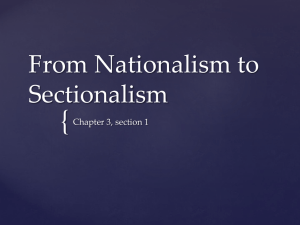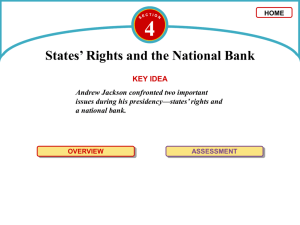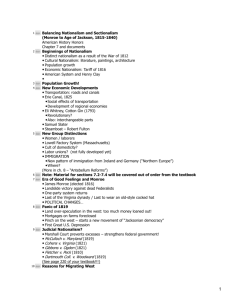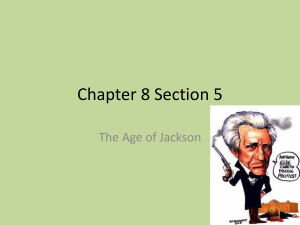Chapter 7 Balancing Nationalism and Sectionalism Section 1
advertisement
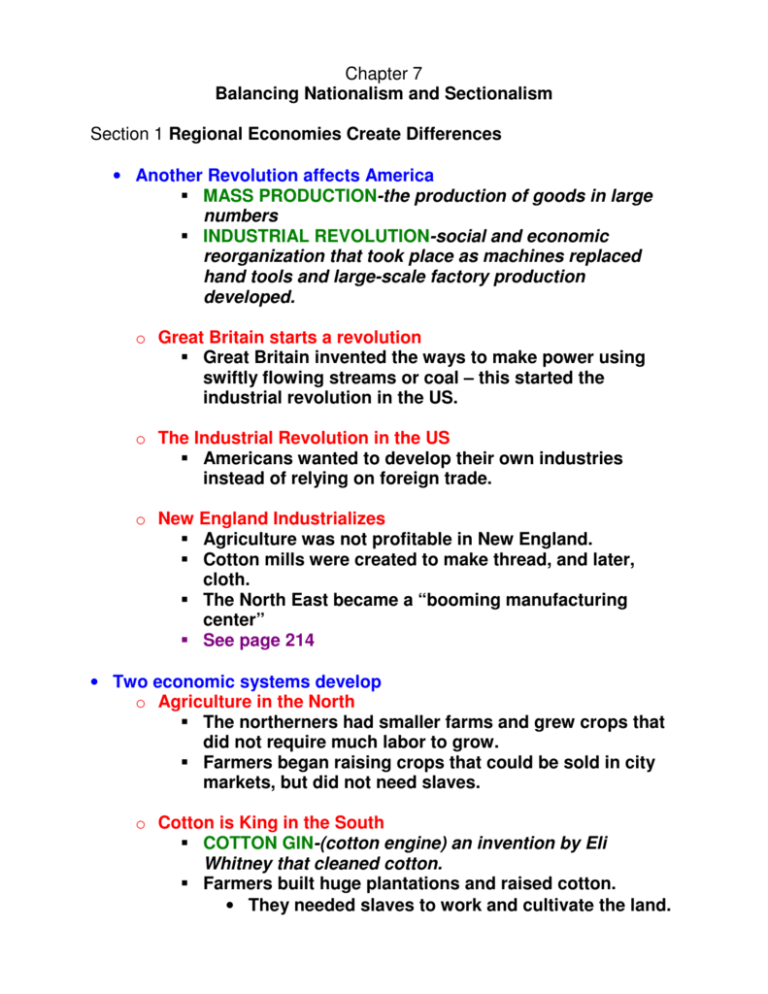
Chapter 7 Balancing Nationalism and Sectionalism Section 1 Regional Economies Create Differences • Another Revolution affects America MASS PRODUCTION-the production of goods in large numbers INDUSTRIAL REVOLUTION-social and economic reorganization that took place as machines replaced hand tools and large-scale factory production developed. o Great Britain starts a revolution Great Britain invented the ways to make power using swiftly flowing streams or coal – this started the industrial revolution in the US. o The Industrial Revolution in the US Americans wanted to develop their own industries instead of relying on foreign trade. o New England Industrializes Agriculture was not profitable in New England. Cotton mills were created to make thread, and later, cloth. The North East became a “booming manufacturing center” See page 214 • Two economic systems develop o Agriculture in the North The northerners had smaller farms and grew crops that did not require much labor to grow. Farmers began raising crops that could be sold in city markets, but did not need slaves. o Cotton is King in the South COTTON GIN-(cotton engine) an invention by Eli Whitney that cleaned cotton. Farmers built huge plantations and raised cotton. • They needed slaves to work and cultivate the land. o Slavery becomes entrenched More plantations meant more slaves were needed. See page 216 • Clay proposes the American System HENRY CLAY-House Speaker who pushed the AMERICAN SYSTEM-which would unite the nation’s economic interests by develop transportation systems, establish a protective tariff, and rebuild the National Bank. o Erie Canal and other internal improvements The US government looked for ways to build a system of roads. NATIONAL ROAD-road that extended from Maryland to Illinois. ERIE CANAL-connected the Hudson River to Lake Erie to open up commerce between the Atlantic Ocean to the North. See page 217 How the West was Won o Tariffs and the National Bank TARIFF OF 1816-a tariff on imported products to encourage Americans to buy US made goods. America was divided over the tariff. Northerners were against the tariff, but the southerners supported it. Most people thought the 2nd National Bank would benefit the United States. Section 2 Nationalism at Center Stage • The Supreme Court boosts national power o Strengthening government economic control MCCULLOCH V. MARYLAND-Maryland was not allowed to tax the Bank of the US. The court declared the Bank constitutional. o Limiting state powers The court blocked state interference in business and commerce, even if it meant blocking a state law. • Nationalism shapes foreign policy JOHN QUINCY ADAMS-Secretary of state who developed a new foreign policy based on NATIONALIASM-the belief that national interests should be placed ahead of regional concerns. o Territory and boundaries The US and Canada demilitarized the border and fixed the border on the 49th parallel. ADAMS-ONIS TREATY-Spain gave up Florida and the Oregon territory to the United States. See page 221 o The MONROE DOCTRINE-a policy stated by President Monroe of US opposition to any European interference in the affairs of the Western Hemisphere. • Nationalism pushes America West o Expansion to the West Many people started moving west to escape debts or the law, or to make money. o Missouri Compromise Until 1818, the US was made of 10 free and 10 slave states. When more territories wanted to come into the US, both the North and South were afraid the balance would be changed. The MISSOURI COMPROMISE-a series of agreements passed by congress to maintain the balance of power between slave states and free states-Maine became a free state, and Missouri was a slave state. See page 223 Section 3 – The Age of Jackson • Expanding Democracy changes politics ANDREW JACKSON-won the popular votes, but lost the election to John Quincy Adams in 1824 when the House had to break the tie. o Tension between Adams and Jackson DEMOCATIC REPUBLICAN PARTY-was created by supporters of Jackson (Jacksonians). o Democracy and Citizenship Most states allowed more people to vote, which helped Jackson. • Jackson’s new presidential style o Jackson’s appeal to the common citizen Jackson presented himself as being a common man. o Jackson’s Spoils System Jackson believed in the SPOILS SYSTEM-giving jobs and favors to loyal supporters. • Removal of Native Americans o Americans wanted the land of the Native Americans for mining and planting. INDIAN REMOVAL ACT of 1830-the US government provided money to negotiate treaties that would force Native Americans to move west. About 90 treaties were signed. o Cherokee fight back The Cherokee nation tried to keep their land by using the US legal system. They almost won until they signed the Treaty of New Echota, which gave the last of the land to the US for $5 million. o TRAIL OF TEARS-The Cherokee were sent off in groups to the West. Many of them died along the way, and their money and livestock was stolen along the way. o See page 227 Section 4 – States’ Rights and the National Bank • DANIEL WEBSTER-Massachusetts senator who coined the phrase, “Liberty first and Union afterwards.” • A tariff raises the states’ rights issue o Nullification theory • JOHN C. CALHOUN-Jackson’s vice-president • TARIFF OF ABOMINATIONS-Calhoun’s name for the 1828 tariff increase that helped the north and the south’s expense. • Calhoun made a nullification theory that said the original 13 states were sovereign and could reject a federal law it declared was unconstitutional. o Hayne and Webster debate states’ rights What is more important, national laws or states’ rights? o South Carolina Rebels Nullification: “SC declared laws passed by Congress were unauthorized by the Constitution & ∴null, void, and no law” • Jackson attacks the National Bank BANK OF THE UNITED STATES o Jackson opposes the bank o Pet Banks Loyalty to the Democratic Party o Whig Party forms Backed ideals of the American System—Henry Clay Protective tariff Use federal money to build roads & canals Federal control of the banking system Nationally accepted currency See page 233 • Van Buren deals with Jackson’s legacy o Jackson’s legacy PANIC OF 1837—economic problem • Bank closings • Collapse of the credit system—lost savings • Bankrupted 100s businesses • 1/3 people out of work o Harrison and Tyler WILLIAM HENRY HARRISON • Whig Party candidate • Won—died month later JOHN TYLER • Harrison’s VP • “His Accidency” See page 236: “Balancing Nationalism & Sectionalism”


